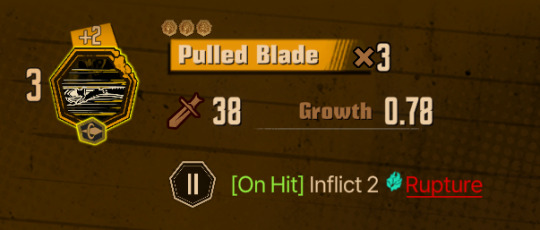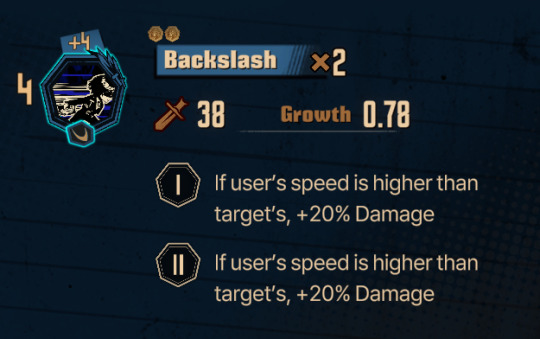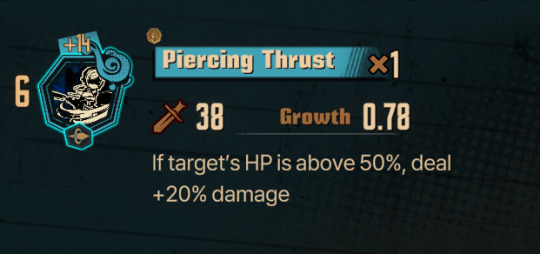#also lu (if i can call u that) ur analysis is really cool and made me think :]
Text
i read lu-is-not-okay's sin analysis guide and it made me think about outis some more (mainly base outis)
TL;DR for the guide: Each sin's meaning is likely different from the mainstream interpretation of them (e.g. Lust does not necessarily mean being horny), and an identity's skills represent the layers of their psyche (With s1 being the surface layer and s3 being the deepest layer of the mind)
I should note that this draws from my previous theory of Outis's story so it might be needed to check that out to clear any confusion. Also, since Outis's story isn't going to be released for a very long time, this is really just conjecture.
Anyway...
Outis has a sloth s1 (Pulled Blade), a pride s2 (Backslash), and a gloom s3 (Piercing Thrust), right?

Going by the guide, Sloth S1 represents Outis's resignation to her circumstances. She's given up on hopes of ever returning home after the Smoke War, believing it to be totally impossible.

Pride S2 likely alludes to a fatal mistake Outis made out of hubris during the Smoke War, one that could possibly even be the reason why she cannot return home. Since we don't have her story yet, this is more based off of Outis's source material.
In The Iliad, the protagonist Odysseus had been captured by a giant called Polyphemus. When he demanded his name, Odysseus told him his name was "Ουτις" (Outis), which means 'nothing' in Greek. Odysseus later blinded the giant, who screamed "Outis (nobody) is killing me!" (and thus leading the other giants to ignore his pleas) and allowed them to escape.
However, before leaving, Odysseus revealed his true name to Polyphemus in an act of hubris, taunting him. As a result, Polyphemus was able to pray to his father Poseidon to curse Odysseus to “[never] reach his native land, to [never] come once more to his own house and see his friends again” and to “let him come late, in evil plight, with all his comrades dead, in someone else's ship, and find troubles in his household."
Sounds pretty familiar to Outis's predicament, right?
Afterwards, gaining a grudge against Odysseus, Poseidon began sabotaging Odysseus's journey. All of which would have been prevented had Odysseus's arrogance not gotten the best of him.
Returning to Limbus Company Outis, I feel like Pride S2 would represent her invoking catastrophe the same way as Odysseus -- in an act of arrogance, she will make a huge mistake with terrible consequences (perhaps being the reason why she cannot return home?). Could be her revealing her identity to the enemy to brag -> said enemy pulls a few strings and finds a way to prevent her from returning home, or it could be something less 1-to-1 with The Iliad. Either way, the skill would allude to her ignoring the consequences of her actions in that one moment.
Alternatively, it could refer to her participating in the Smoke War, not quite aware of the potential consequences that could result from leaving her home.

Finally, Gloom S3. This one is a bit hard to pin down with actual evidence because, again, we know very little about Outis's actual past. Additionally, nothing really suggests that Outis is "overwhelmed" with negative emotions at the time of this post. In fact, she's known for being the most rational and collected sinner, despite her obsequious attitude towards Dante. (There's probably something from The Iliad that I could connect to here, but I honestly don't know that much about the epic.)
That being said, I imagine it'd have something to do with regret. Whatever conceited mistake Outis made came back to bite her in the ass, and now she can never return home to those that wait for her. Indeed, she would definitely dwell on her unfortunate circumstances even if she is resigned to them. "If only I hadn't let my hubris get the better of me."
As for appearing rational and seeming the exact opposite of "overwhelmed with negative emotions"...
I have nothing to support this, but it's possible that Outis's implied duplicity through her sycophantic behavior towards Dante is a front. She's well aware that all of the other Sinners and Vergil think she's going to backstab them at any moment -- that's the point of it. It's a smokescreen to cover up how she actually feels, which is intense lament due to being unable to see her loved ones ever again.
That doesn't necessarily mean said treachery is "fake", since she could still backstab them (although you could argue that if she really did want to betray them, she wouldn't make it so obvious). It's just that she intentionally uses said sycophancy and hints of disloyalty, however genuine they may be, to mask her actual issues and her past.
#sorry for the scuffed iliad summary i just took it from the entry on outis on the lcb wiki. ive never actually read the iliad#also lu (if i can call u that) ur analysis is really cool and made me think :]#outis lcb#limbus company#limbus company spoilers
89 notes
·
View notes